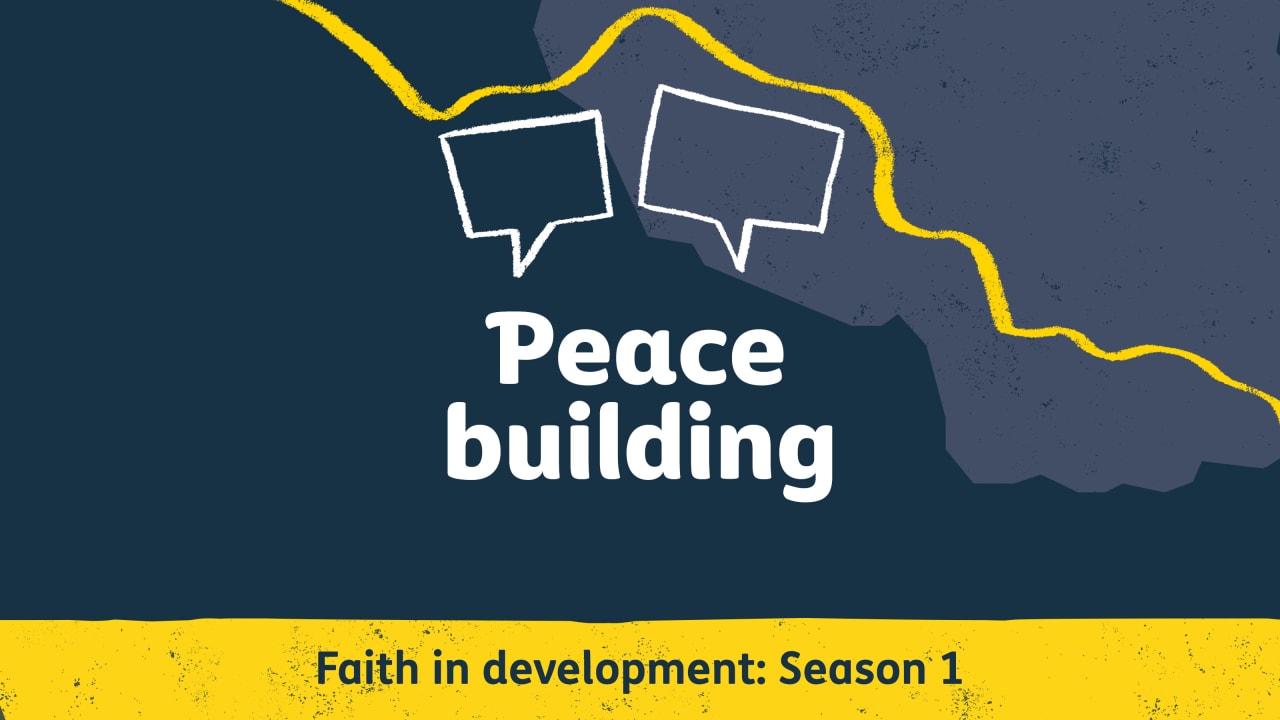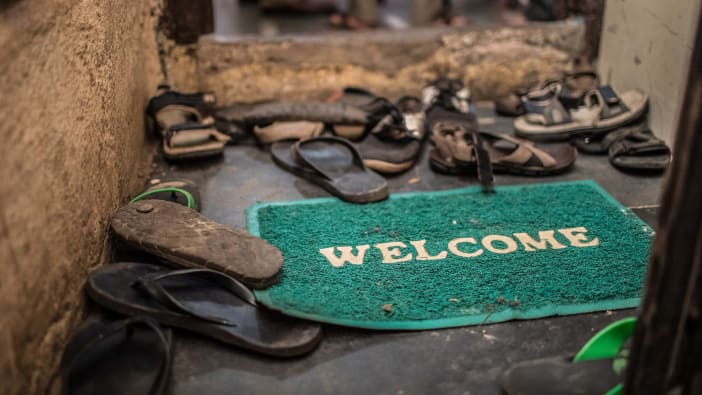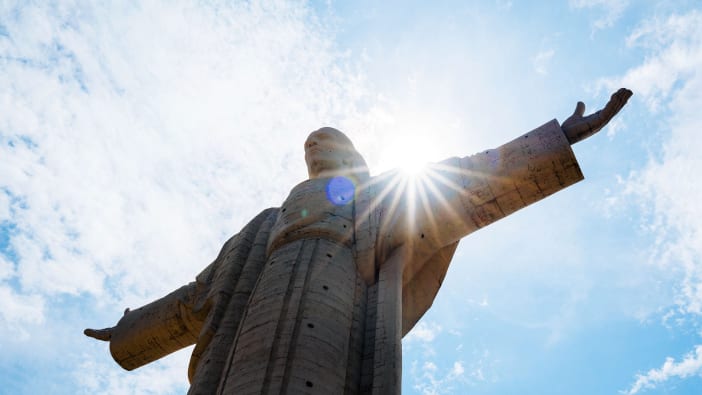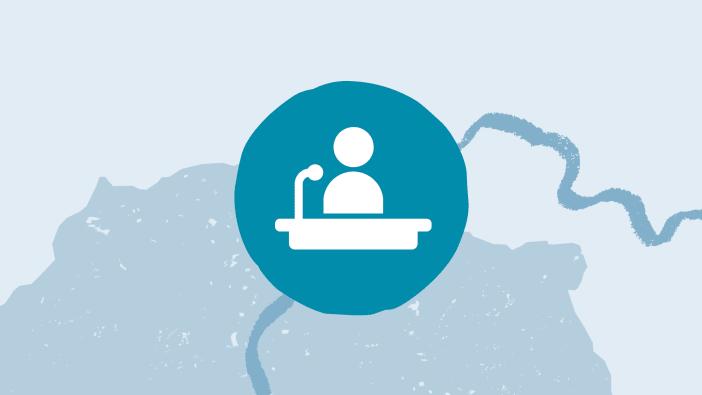David Couzens 1:09
For me, I think a key part about hospitality is providing a space where people can come as they are, as who they really are without having to put on a mask or pretend to be something else. And I think part of that is about providing a space without an agenda. It's where you're not trying to convince or persuade or get anything out of it. It's just a space where you can be and where people can be together in whatever way they feel comfortable doing that. And so people can come with different views, and different opinions, and be free to share those. It's a space though, which is not without rules, there are rules of behaviour, about how you relate to each other, and acceptance of those rules. And as you create that, I think you create a space where people can develop a relationship with each other. And I think as Henry Nouwen said, elsewhere, 'it's a place where you're not trying to change somebody'. But it's a place where, in not trying to change somebody, actually change happens because it comes from within them. They begin to perhaps see elements of themselves more deeply, elements of others more deeply. They're able to reflect on those issues. And through that, somehow there is a space where change comes. I think within it, one of the things we're finding in our work, I think, is the power of vulnerability. It's a place where people feel safe enough to be vulnerable with each other. And as we share that vulnerability, something very special happens. I think, in some ways, we're creating space for the Holy Spirit to work and for healing to happen. And creating that space is true hospitality.
Alice Philip 3:06
Thank you. Mariam, what would you like to add?
Mariam Tadros 3:10
Just as David was speaking, I was thinking about the current climate in which some of us find ourselves living. Which is, in many of our countries right now, one of division, one of political division, one of socio-economic division. I think I was just reflecting on the deep need for us to shift our stance both individually, but as communities living amongst each other, from this hostility into hospitality. And the need for us to recognise that walls only keep us further apart from each other. And they don't allow us to create and to actually progress. But they constantly mean that there is tension and there is one person on either side of that wall. So, for me, the importance of hospitality within the peacebuilding context, within the work of trying to affect conflict is one where it's, I think, like David said, creating space where you can come with your truth and begin to move into a space that knocks down those walls and offers for others to come into it as well.
Alice Philip 4:27
A question to either of you or both of you. What does it look like to be a host within this space?
Mariam Tadros 4:35
My experience of where hosts have been hospitable, is where there is, I think David really hit it on the head with that word vulnerability where vulnerability comes with a sense of security of self and knowing who you are in and of yourself and your own identity and both the good and the bad and the things that you're struggling with and the things that you read. Clear on, and your ability to hold that space, and not feel threatened by the person coming in. But being able to look at that person, and see their creative being, see their self as being made in the image of God and recognizing for me, my own experience has been trying to recognise that each person is on a journey, of discovery and of evolution and of figuring out who you are. And if you're able to look at each person in that way, it comes with a little bit more grace for where they might be, even if that place is in a completely different space to where you are. And so for me, there's something really deep about being secure in who you are, and secure and your vulnerability in many ways.
Alice Philip 5:48
So offering grace from a place of security. Yeah, that's really beautiful. The other word that came to mind when you were speaking with generosity, and I'm wondering, what do you see is the connection between hospitality and generosity?
David Couzens 6:04
That combination of hospitality and generosity, it's about the generosity of spirit, it's about not judging. It's about recognising the value of people and people's opinions, even if you disagree with them. And I think there is something very significant as well in that security in yourself, including your doubts. It's not that you have to have every answer, or know everything or be everything or be the sort of the perfect Christian, but being secure enough that you are on some journey as well. I was reminded of a time when my wife and I were at a big Christian gathering. And my wife was struggling with a number of things at the time, illness and things and she had gone up for prayer. And she had expressed a sense of frustration and disappointment, and a woman was praying with her. And immediately this woman just spoke out quite fiercely, saying you must repent, you must repent. And that was a very inhospitable place that lady had brought with her, her insecurities and was pushing those onto my wife and my wife, not surprisingly, recoiled. And a day later, I went up for prayer. And I was telling this story to the person I was stood next to. And this man didn't say anything at any point. But just as I was telling this, he just groaned and groaned. And there was a level of deep empathy that was happening there. And that felt for me like a very, very hospitable place.
Alice Philip 7:03
That's such a beautiful illustration of what it means to be hosted, and what a difference that can make. And on the other side, what a lack of hospitality can do to increase conflict to take away the seedlings of peace. So thank you for sharing that from that vulnerable place as well, David. Here's Rami Talib talking about hospitality in his context, in Lebanon.
Rami Talib 8:08
Well, I guess for us would be more related to the people and what kinds of space they need. For example, we're working with young people, who are devoted to sport, they love to play sport. Their best space to come together was the sports ground, whether that means playing basketball, football, or whatever. That brings them to a place where they're familiar, and they enjoy each other as well. And then able to get together to know each other. So, a safe space could be many different things. It's not only one thing. It really, really depends on each group and what I would say is that it is very important to have the space to be out of their own place. If you bring in people that are living in the community and the suffering in that community, you know, and then you have another community, you need to get them to something totally different. Something more beautiful. Something where they can be there and feel peaceful and feel safe, and not threatened by the surrounding what's happening there. Because many times when where people would or were in conflict, they think the other area is unsafe areas which you should not go. For example, I'm living in the South of Lebanon, but I'm from Beirut, my friend doesn't come to this house because they think it's unsafe. So, for them, they will not come by rules. I want to bring people from Beirut and bring from the South. I will go to the mountain, where it's common ground for them where they can both go there and feel and feel happy to be there and also, naturally joyful and peaceful so they can do activities together. We work with Lebanese Palestinian refugees, Syrian refugees and Iraqi, and the background is most of them are Muslims and Christians. So with that diversity, you know, it's interesting because people don't know what the other thing is. They only have their own assumptions. When they bring them together to start learning with each other, they discovered there are things that actually are common, and things that are not common. But it's very helpful to break what we think about each other, especially from not just religious idea, but more about this person's needs. Like, if he wants to be educated, he wants to succeed in life, he wants to have a family, he wants someone to love him, which is, when we forget these things, when we actually, I guess the other person, we don't see him anymore as a human. So to speak about the last group that we're doing, we have Syrians and Yazidis. And then we had Christians and Muslims. We intentionally wanted to bring a safe place so they can speak about their religion. The idea was in the program, doing the forgiveness with them, is to have some questions that are related to the religion. So, God is mercy? Was that common in your religion? And then both of them are able to share what that means in their place. And as they will find, 'oh, yeah, I didn't know that in the Quran, says *speaks in Arabic* that God is all merciful, you know. That means that 'God have mercy on them'. And, and also as well, for Christians, God is mercy and the way that he deals with us. So that's one of the common grounds that comes up. Every one, every time will more intentionally work on the common grounds, so they can see each other. And even if there were some differences, obviously, they disagree, which is fine. The idea is to learn how to be in conflict, but the non-violent way.
Alice Philip 12:02
So we've spent a bit of time exploring the concept of hospitality. It'd be great to have some stories. David, I think you've got a story from Northern Ireland that might help us think about hospitality?
David Couzens 12:14
Yes, so I was traveling once with a friend and colleague from Northern Ireland called Derek Poole. And I asked him who he felt had been significant people in the peace process in Northern Ireland. I was expecting to hear names that are heard of or seen on the news. He came up with the name of a priest I'd never heard of. He then explained that this person had just begun inviting people with an open invitation to Sunday lunch. And initially, people from their own church would come. And then they began to notice that there were people she didn't recognize were coming. And she then realized that this was a mix of both Protestant and Catholic. So people from either side of the conflict in Northern Ireland were coming and meeting at her house for lunch. And then over time, she noticed that it changed again. And she suddenly realized that the people who were meeting regularly for lunch at her house, were actually people from the armed militias from each side who were coming, and just having lunch together. The reason that happened, is in his view because there was no agenda. There was no meeting with a purpose. It was just a meeting to have lunch. In that meeting, having lunch just became a safe space where people could come and begin to have a very cautious or tentative relationship with each other because there were no expectations of them. That then developed and in his view, she was one of the most significant people in the peace process. Because what she was doing was building a level of trust at a real, community, grassroots level. This then meant that at the higher levels, political agreements could be made, because then the people negotiating them knew that there was enough trust at the community level for those to actually stick. A very simple thing, inviting people for lunch, no agenda, no purpose, just come and have some lunch. And I think that's some of the power of hospitality.
Alice Philip 14:26
Eating together, building trust, that's a really beautiful story. Mariam, have you got any stories about hospitality you'd like to share with us?
Mariam Tadros 14:35
The story that came to mind for me was when we first started out on the peacebuilding work, sort of 4 and a half years ago. One of the first things we did was attend a Justice Conference, which was out in South Africa, on Robben Island. We were living in the prison for good five nights, which was fun. But part of that process was both for South Africans, white South Africans, and black South Africans to come together in that space to talk about justice and what that meant at a local level. They'd also invited people from all around the world to be a part of that space. There's one particular person who is right at the top of my mind called Rosie Wenbo, who is a West Papuan activist. She comes from a community that is heavily patriarchal, from a country and a place that is undergoing currently waves of civil unrest where they're really struggling with natural resources and they're struggling to keep the lights on. The political tensions between the indigenous groups versus the political elite are really coming head to head. She has been an activist within the church, and within her community for years, at a very quiet low level. I just remember this one moment, I think it was about day four on Robben Island, where we'd been having lots of these storytelling spaces and we'd been getting to know one another. I remember we were in a circle and people were sharing stories of their own journey along that week, what had opened up for them, and what was on their hearts and minds, essentially. I remember this particular moment when Rosie stood up. I remember thinking, this is the first time I've heard her speak. I remember her standing up and speaking and telling her story of being a survivor of various things in her country, telling us how that was the first time in her life that she had felt empowered as a woman to stand up and speak and share her own story essentially. And for only what allowed that to happen. I remember her saying while she was speaking to us the fact that she had built friendships, and built relationships in a space that was hospitable for her, where she felt welcomed and beyond just welcomed, where she felt equal. That for her was the first experience. And that gave her the ability to stand up to speak. And I think we even ended up doing a bit of the West Papuan national anthem if I remember rightly. But it was just this incredible moment of recognizing where equality and that feeling of equality can unlock things for people who have never had that space before.
Alice Philip 17:24
Hospitality at work, building trust, empowering people. That's great. Thanks, Mariam. To end, when I think of hospitality, I do think of food. And I think Mariam might have a story to share with us that relates to the link between food and hospitality.
Mariam Tadros 17:45
The story is the story of my life, because I grew up to Middle Eastern parents where all of our lives were surrounded by food, essentially, and the hospitable space, particularly in the Middle East, is very much around the table. Just one thing I was thinking about as we were having this conversation was my own experience of actually growing up as an Egyptian in the UK. And how both hospitality around the table is a beautiful way of inviting people in. But it's also a very clear way of saying who's accepted and who's not depending on who you invite around the table. And so it's less a kind of specific story, but more a sense of, I've recognized in my own life. Having to navigate different spaces, different cultures, and different races growing up in a minority, especially in the UK where I've had to make a conscious choice and effort to, term of phrase, by often chaining to diversify my life. The way I choose to do that is by inviting people into my home and inviting them around the table. For me, that's kind of the gospel thing as well, isn't it, that we always hear Jesus' deepest thoughts when he's having food with his friends. But it's that thing of coming around the table and inviting people. I know that for my own family, you know, we invite the people who we feel comfortable with around our table. That's a very conscious choice to share food with people. I think in so many of the cultures in which we've engaged or experienced, that coming around food and sharing and bread, and whatever else might be there, is such an essential part of saying, 'I want to be in a space with you', offering whatever you've created to that person as well.
Alice Philip 19:38
Thanks, Mariam. That leaves me with the question of who is around my table? And what kind of hospitality am I showing, or are we showing in our lives? Thanks for bringing so many thoughtful words to us today. Hopefully, our listeners will be joining us again next episode to hear more about the journey of peacebuilding that we've been on at Tearfund. We've done moral imagination, today was hospitality, and next time we'll be thinking about embrace. Thank you all for listening. We'll see you soon.










